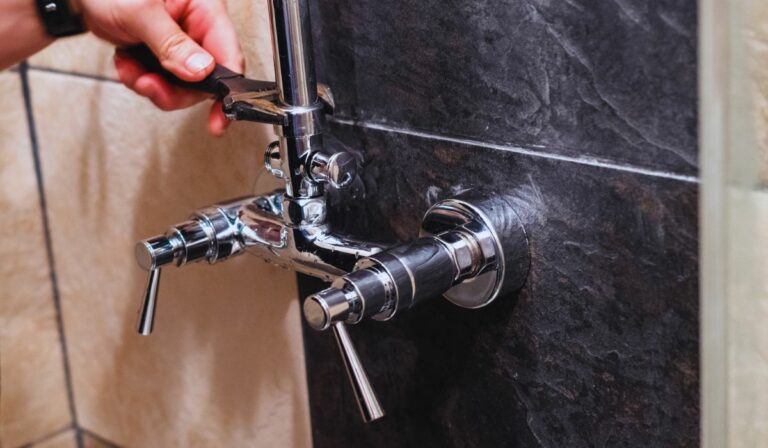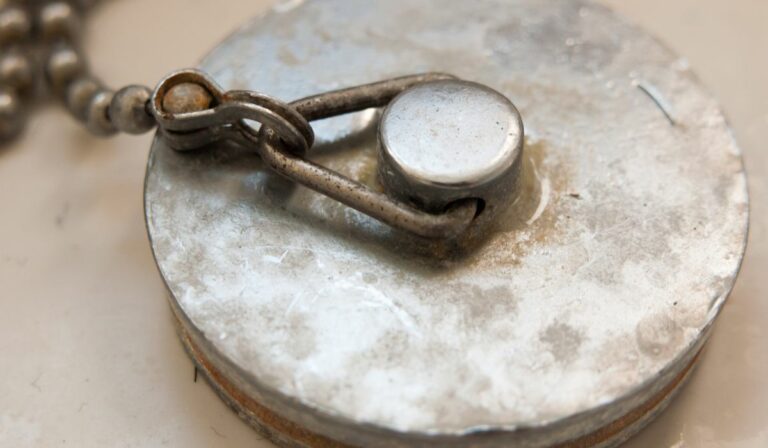What to Clean Shower With
You can clean your shower effectively with natural ingredients like white vinegar and baking soda, which break down soap scum and kill mold without harsh chemicals. Vinegar disinfects and deodorizes, while baking soda gently scrubs away grime. For tougher stains, commercial cleaners work fast but use them carefully to avoid damage. Use a soft brush or microfiber cloth to protect surfaces. If you want to discover safer techniques and tips for sparkling glass doors and mildew removal, keep exploring.
Common Causes of Shower Dirt and Stains
Although you might clean regularly, shower dirt and stains still build up because of several common causes. Hard water leaves mineral deposits like calcium and lime, which create stubborn white or greenish stains. Soap scum forms when soap mixes with minerals in the water, sticking to tiles and glass surfaces.
Your body oils, sweat, and dead skin cells accumulate over time, contributing to grime and discoloration. Mold and mildew thrive in the damp, warm environment of your shower, causing black or dark green spots.
Poor ventilation worsens moisture buildup, making stains harder to remove. Understanding these causes helps you target your cleaning efforts more effectively and prevents recurring problems. Addressing these factors regularly keeps your shower sparkling and hygienic.
Natural Ingredients for Shower Cleaning
Understanding what causes shower stains and grime makes it easier to choose the right cleaning methods. You can tackle soap scum, mineral deposits, and mildew effectively using natural ingredients.
White vinegar is a go-to for breaking down hard water stains and soap scum; just spray it on, let it sit for a few minutes, then scrub.
Baking soda works well as a gentle abrasive; sprinkle it on damp surfaces to lift dirt without scratching.
Lemon juice’s natural acidity helps dissolve soap residue and leaves a fresh scent.
For mildew, hydrogen peroxide is a safe, natural disinfectant that you can apply directly.
Combining these ingredients gives you an eco-friendly, affordable way to keep your shower sparkling without harsh chemicals.
Commercial Shower Cleaners: Pros and Cons
When you need a quick and effective way to clean your shower, commercial cleaners can be tempting because they’re designed to tackle tough grime with minimal effort. These products often contain powerful chemicals that break down soap scum, mold, and mildew fast, saving you time and elbow grease.
However, you should be cautious about the strong fumes and potential skin irritation they may cause. Some commercial cleaners can also damage delicate surfaces or finishes if used improperly. Additionally, they might contain harsh ingredients that aren’t environmentally friendly.
If you decide to use them, always follow the instructions carefully, wear gloves, and ventilate the area well. Balancing effectiveness with safety and environmental impact helps you choose the best cleaning option for your shower.
How to Use Vinegar for Shower Cleaning
If you want a natural and affordable way to clean your shower, vinegar is an excellent choice. Start by mixing equal parts white vinegar and water in a spray bottle. Spray the solution generously over shower walls, doors, and fixtures. Let it sit for 10 to 15 minutes to break down soap scum and mineral deposits.
After soaking, scrub surfaces gently with a soft cloth or sponge. For stubborn spots, apply vinegar directly without dilution and allow more soaking time. Rinse everything thoroughly with warm water to remove vinegar residue.
Vinegar’s acidity disinfects and deodorizes naturally, making it safe for most shower materials. Use this method regularly to keep your shower sparkling without harsh chemicals or expensive cleaners.
Baking Soda as a Gentle Abrasive Cleaner
Although vinegar works well for dissolving grime, baking soda offers a gentle scrubbing action that’s perfect for tackling stubborn stains without scratching your shower surfaces.
You can sprinkle baking soda directly onto wet surfaces or make a paste by mixing it with water. Apply it to areas with soap scum or mildew, then gently scrub using a soft cloth or sponge.
Baking soda’s mild abrasiveness lifts dirt while deodorizing and neutralizing odors, leaving your shower fresh. After scrubbing, rinse thoroughly with warm water to remove residue.
Baking soda is safe for most shower materials, including tile, glass, and fiberglass, so you don’t have to worry about damage. Plus, it’s an inexpensive and eco-friendly option that keeps your cleaning routine simple and effective.
Effective Tools for Shower Cleaning
Choosing the right tools can make shower cleaning faster and more effective. You’ll want a sturdy scrub brush with stiff bristles to tackle soap scum and grime without scratching surfaces.
A handheld scrubber or sponge with a non-abrasive side works well for delicate tiles and glass. Don’t forget a squeegee—it’s perfect for wiping down walls and doors after cleaning to prevent water spots.
For tight corners and grout lines, use an old toothbrush or a small detail brush to reach spots a larger brush can’t. Microfiber cloths are great for wiping down fixtures and polishing surfaces to a streak-free shine.
Having these tools ready will help you clean thoroughly and maintain your shower’s sparkle with less effort.
Removing Mold and Mildew Safely
Since mold and mildew thrive in damp, warm environments like your shower, tackling them quickly is essential to keep your bathroom healthy and fresh. Start by ventilating the space—open windows or run the exhaust fan to reduce moisture.
Use a mixture of equal parts white vinegar and water in a spray bottle, applying it directly to affected areas. Let it sit for at least 10 minutes to break down mold spores.
Then, scrub with a soft brush or sponge to avoid damaging surfaces. Rinse thoroughly with warm water and dry the area completely with a clean towel.
For tougher spots, a baking soda paste can boost cleaning power.
Always wear gloves and ensure good airflow to protect yourself from spores and cleaning agents.
Cleaning Glass Shower Doors Without Streaks
When you clean glass shower doors, streaks can easily spoil your efforts and make the surface look dull. To prevent this, start by rinsing the doors thoroughly with warm water to remove soap residue.
Use a mixture of equal parts white vinegar and water in a spray bottle; spray the glass and let it sit for a few minutes before wiping with a microfiber cloth. Avoid paper towels since they can leave lint and streaks.
After wiping, dry the glass immediately with a clean, dry microfiber cloth, moving in a circular motion to ensure even drying. For stubborn spots, use a non-abrasive sponge with the vinegar solution.
Following these steps helps you achieve sparkling, streak-free glass doors every time you clean.
Tips for Maintaining a Clean Shower Between Deep Cleans
Although deep cleaning your shower is essential, maintaining its cleanliness between thorough scrubbings saves you time and effort.
To keep your shower fresh, wipe down walls and doors with a squeegee or microfiber cloth after each use to prevent water spots and soap scum buildup.
Use a daily shower spray or a simple mixture of water and vinegar in a spray bottle to lightly mist surfaces, helping inhibit mold and mildew growth.
Keep the shower well-ventilated by leaving the door or curtain open after showers to speed drying.
Regularly clean the drain cover to avoid clogs and unpleasant odors.
These small, consistent actions make deep cleaning easier and keep your shower looking spotless longer.
Avoiding Damage While Cleaning Different Shower Materials
To protect your shower’s surfaces, you’ll want to choose cleaning methods that suit each material. For tile, use a mild cleaner or a vinegar-water solution to avoid etching grout or tiles.
Avoid abrasive scrubbers on glass doors; instead, use a soft cloth or sponge with a gentle cleaner to prevent scratches.
Acrylic or fiberglass tubs need non-abrasive cleaners to maintain their finish—steer clear of harsh chemicals that cause dullness or cracks.
If you have natural stone like marble, never use acidic cleaners; opt for pH-neutral products designed for stone to avoid damage.
Frequently Asked Questions
Can I Use Bleach to Clean My Shower Safely?
Yes, you can use bleach to clean your shower safely if you dilute it properly and ensure good ventilation. Avoid mixing bleach with other cleaners, wear gloves, and rinse thoroughly to protect your surfaces and health.
How Often Should I Deep Clean My Shower?
You should deep clean your shower at least once a month to prevent mold, soap scum, and grime buildup. If you notice stubborn stains or mildew, don’t hesitate to clean it more frequently for a fresh, hygienic space.
Are Steam Cleaners Effective for Shower Cleaning?
Yes, steam cleaners are effective for shower cleaning. They loosen grime, kill bacteria, and remove soap scum without harsh chemicals. Just make sure to use the right attachments and follow safety guidelines for best results.
Can Essential Oils Be Added to Shower Cleaners?
Yes, you can add essential oils to shower cleaners for a fresh scent and extra antibacterial properties. Just mix a few drops carefully with your cleaner to avoid irritating your skin or damaging surfaces.
How Do I Prevent Hard Water Stains in the Shower?
You can prevent hard water stains by wiping down the shower after each use, using a squeegee, and applying a water-repellent spray. Also, consider installing a water softener to reduce mineral buildup over time.
Conclusion
Keeping your shower clean doesn’t have to be a chore. By using natural ingredients like vinegar and baking soda, you can tackle grime and stains effectively while avoiding harsh chemicals. Remember to address mold and mildew promptly and clean glass doors carefully to prevent streaks. Regular maintenance between deep cleans will save you time and effort. Just be mindful of your shower’s materials to avoid damage, and you’ll enjoy a fresh, sparkling shower every day.



